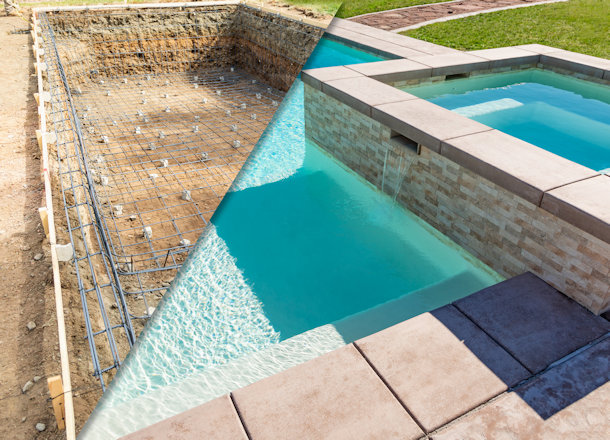Depending on where you live, there may be a large market for pool installers. If that’s the case, there’s a decent chance that you’ve seen several pool companies come and go over the years. Pool installation seems like it should be simple, but the truth of the matter is that installing a pool that doesn’t leak and that holds up against the weather year after year is a lot harder than you’d think.
If you’ve considered specializing in pool installation, there’s a lot that you need to know. Installing a pool involves a lot more than just digging a hole and dropping in a liner. If you’re up to the challenge, though, you could find a very lucrative specialization that provides you with some very loyal customers.
What Does a Pool Installer Do?
Licensed pool installers do more than just install swimming pools in the ground. In most cases, a swimming pool installer does both above-ground and below-ground pools as well as spas, hot tubs and similar water features over a certain value. They also perform electrical installations for equipment such as automatic pool covers or solar heaters. Some installers even provide services such as building decks, enclosures, and other pool-related features.
The job of the installer requires either the use of certain subcontractors or a wide range of skills since you’ll be doing excavating, plumbing, installation, wiring, chemical handling and possibly even a bit of construction. You can see why a lot of fly-by-night pool installers close up shop once they realize exactly how much work is actually involved in pool installation.
Becoming a Pool Installer
As with many types of contract work, your most likely entrance to becoming a pool installation contractor is to work with an existing licensed contractor. Simply taking a job at a pool company may not be sufficient to give you the experience you need; sellers and even maintenance technicians may not require licensing in your state, so you’ll need to work with the actual installation team to gain experience with a contractor.
While you may already have experience working with excavation and other skills that a pool installer requires, there are a number of best practices that may be hard to pick up on your own. A seasoned installer can teach you about whether gravel or sand is the best backfill to go behind a fiberglass liner, provide suggestions on the best way to locate leaks and maybe even give you advice on less common pools such as saltwater pools or so-called “natural” pools that filter water by allowing plants to grow in certain areas at the edge of the pool.
Pool Installer Licensing
To work as a pool installer, you’ll normally have to be licensed as a contractor with the pool installation specialization through the state you live in. Most states have a value limit under which a job doesn’t require a licensed contractor, though this varies from state to state; while one state might require a specialty contractor for all jobs over $500, another might have that limit set at $5,000. Given the cost of a pool and the range of skills required to successfully install one, it’s likely that any jobs you would take will fall above this cutoff regardless of your state of residence.
One thing that’s important to keep in mind is that in most areas, pool installation is a seasonal job. You may have a lot of work in spring and early summer, but things might taper off drastically after that. Specializing in pools can be very rewarding, but if you aren’t careful, the differences between pool installation contracting and other types of contracting can take you by surprise.
If you’ve ever worked doing pool installation, what was the most interesting swimming pool that you and your team installed?


